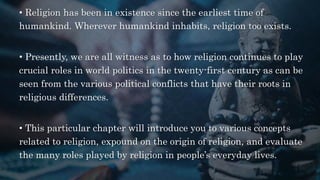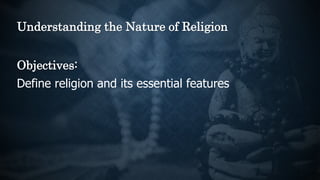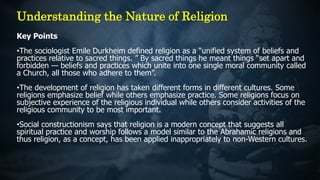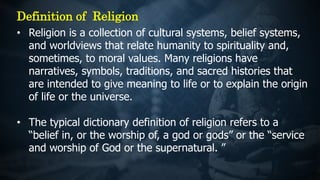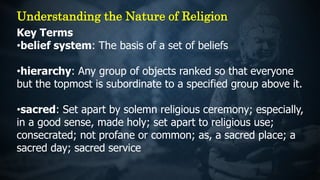natureofeligion.pptx
- 2. âĒ Religion has been in existence since the earliest time of humankind. Wherever humankind inhabits, religion too exists. âĒ Presently, we are all witness as to how religion continues to play crucial roles in world politics in the twenty-first century as can be seen from the various political conflicts that have their roots in religious differences. âĒ This particular chapter will introduce you to various concepts related to religion, expound on the origin of religion, and evaluate the many roles played by religion in peopleâs everyday lives.
- 3. Understanding the Nature of Religion Objectives: Define religion and its essential features
- 4. Key Points âĒThe sociologist Emile Durkheim defined religion as a âunified system of beliefs and practices relative to sacred things. â By sacred things he meant things âset apart and forbidden â beliefs and practices which unite into one single moral community called a Church, all those who adhere to themâ. âĒThe development of religion has taken different forms in different cultures. Some religions emphasize belief while others emphasize practice. Some religions focus on subjective experience of the religious individual while others consider activities of the religious community to be most important. âĒSocial constructionism says that religion is a modern concept that suggests all spiritual practice and worship follows a model similar to the Abrahamic religions and thus religion, as a concept, has been applied inappropriately to non-Western cultures. Understanding the Nature of Religion
- 5. âĒ Religion is a collection of cultural systems, belief systems, and worldviews that relate humanity to spirituality and, sometimes, to moral values. Many religions have narratives, symbols, traditions, and sacred histories that are intended to give meaning to life or to explain the origin of life or the universe. âĒ The typical dictionary definition of religion refers to a âbelief in, or the worship of, a god or godsâ or the âservice and worship of God or the supernatural. â Definition of Religion
- 6. Key Terms âĒbelief system: The basis of a set of beliefs âĒhierarchy: Any group of objects ranked so that everyone but the topmost is subordinate to a specified group above it. âĒsacred: Set apart by solemn religious ceremony; especially, in a good sense, made holy; set apart to religious use; consecrated; not profane or common; as, a sacred place; a sacred day; sacred service Understanding the Nature of Religion

